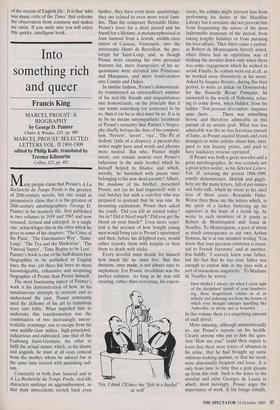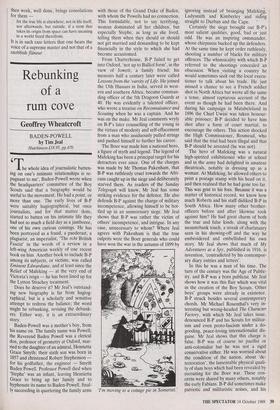Into something rich and queer
Francis King
MARCEL PROUST: A BIOGRAPHY by George D. Painter Chatto & Windus, f20, pp. 800 MARCEL PROUST: SELECTED LETTERS VOL. II 1904-1909 edited by Philip Kolb, translated by Terence Kilmartin
Collins, f25, pp. 482
Many people claim that Proust's A La Recherche du Temps Perdu is the greatest of 20th-century novels; but one could as persuasively claim that it is the greatest of 20th-century autobiographies. George D. Painter in his masterly life, first published in two volumes in 1959 and 1965 and now reissued, revised and enlarged, in a single one, acknowleges this in the titles which he gives to some of his chapters: 'The Cities of the Plain', 'The Guermantes Way', 'Saint- Loup', 'The Tea and the Madeleine', 'The Vinteuil Septet', 'Time Begins to be Lost'. Painter's book is one of the half-dozen best biographies to be published in English since the war, yet there has been no more knowledgeable, exhaustive and unsparing biographer of Proust than Proust himself.
The most fascinating aspect of Painter's work is his demonstration of how, in his simultaneous attempts to recreate and to understand the past, Proust constantly used the alchemy of his art to transform story into fable. What impelled him to undertake this transformation was the combination of two increasingly uncon- trollable yearnings: one to escape from his own middle-class milieu, high-principled, industrious and cultivated, into that of the Faubourg Saint-Germain; the other to fulfil the sexual nature which, to his shame and anguish, he must at all costs conceal from the mother whom he adored but at the same time treated with punishing sad- ism.
Constantly in both Jean Santeuil and in A La Recherche du Temps Perdu, real-life characters undergo an aggrandisement, so that their antecedents stretch back even further, they have even more quarterings, they are related to even more royal fami- lies. Thus the composer Reynaldo Hahn, Proust's lover for a short period and his friend for a lifetime, is metamorphosised in Jean Santeuil from a Jewish, middle-class native of Caracas, Venezuela, into the aristocratic Henri de Reveillon, the pro- totype for Saint-Loup; and, as though Proust were creating his own personal honours list, mere bourgeoises of his ac- quaintance were elevated into Princesses and Marquises, and mere boulevardiers into Counts and Dukes.
In similar fashion, Proust's homosexual- ity transformed an extraordinary number of his real-life friends and acquaintances into homosexuals, on the principle that if one wants something (or someone) to be so, then it (or he or she) must be so. It is in its by no means unsympathetic treatment of Proust's sexuality that Painter's biogra- phy chiefly betrays the date of his composi- tion. 'Pervert', 'invert', 'vice', 'The Pit of Sodom' (title of a chapter): a present-day writer might have used words and phrases more neutral. But who, Painter might retort, can remain neutral over Proust's behaviour in the male brothel which he himself helped to finance and which, weirdly, he furnished with pieces once belonging to his now dead parents? Albert, the madame of his brothel, presented Proust, not (as he had requested) with a real butcher but with a rent-boy who was prepared to pretend that he was one. In mounting excitement, Proust then asked the youth: 'Did you kill an animal today? An ox? Did it bleed much? Did you get the blood on your hands?' Even more repel- lent is the account of how bought young men would bring rats to Proust's apartment and then, before his delighted eyes, would either transfix them with hatpins or beat them to death with sticks.
Every novelist must decide for himself how much life he must live. But this decision, once made, is not always easy to implement. For Proust, invalidism was the perfect solution. As long as he was still creating, rather than recreating, his experi-
'Yes, I think I'll have the "fish in a bucket" as well' ences, his asthMa might prevent him from performing his" duties at the Mazafine Library but it certainly did not prevent him from frequenting the salons of the most fashionable hostesses of the period, from taking lengthy holidays or from pursuing his love-affairs. Then there came a period, as Robert de Montesquiou bitterly noted, when illness had an opportune way of striking the novelist down only when there was some engagement which he wished to avoid. Finally, he seldom went out at all, as he worked away Obsessively at his novel. Asked by Jacques Riviere, during this final period, to write an article on Dostoyevsky for the Nouvelle Revue Francaise, he answered in the words of Nehemia, refus- ing to come down, when bidden, from his ladder: 'Non possum descendere: magnum opus facio. . .' There was something heroic and therefore admirable in this pursuit of an artistic goal. What was less admirable was the no less ferocious pursuit of fame, as Proust cajoled friends and even strangers to write articles about him, intri- gued to win literary prizes, and paid to have laudatory reviews reprinted.
If Proust was both a great novelist and a great autobiographer, he was certainly not a great letter-writer, as his Selected Letters, Vol. II, covering the period 1904-1909, cruelly demonstrates. Skittish and giggly, here are the many letters, full of pet-names and baby-talk, which he wrote to his chief love of those years, Reynaldo Hahn. Worse than these are the letters which, in the spirit of a lackey buttering up his superiors in the hope of a lavish tip, he wrote to such members of le gratin as Robert de Montesquiou and Anna de Noailles. To Montesquiou, a poet of about as much consequence as our own Arthur Symons, he is at one moment writing 'You know that your precious existence is essen- tial to French literature' and at another, less baldly, 'I scarcely knew your father, but the fact that he was your father was enough to endow him in my eyes with a sort of miraculous singularity.' To Madame de Noailles he writes:
How thrilled I always am when I catch sight of the disciplined tumult of your handwrit- ing, those magnificent volutes as of an infinite and pulsating sca from the bosom of which your thought emerges sparkling like Aphrodite, as divine and as beautiful.
In this volume there is a stupefying amount of such drivel.
More amusing, although unintentionally so, are Proust's reports on his health. Clearly anyone who put to him the ques- tion 'How are you?' could then expect to learn that there were traces of albumen in his urine, that he had brought up some ominous-looking sputum, or that his stools were abnormally frequent and loose. It is only from time to time that a gem gleams up from this tosh. Such is the letter to the
• novelist and critic Georges de Lauris in which, most movingly, Proust urges the importance of work. If life brings rebuffs, then work, well done, brings consolations for them - for the true life is elsewhere, not in life itself, nor afterwards, but outside, if a term that takes its origin from space can have meaning in a world freed therefrom.
It is in such rare letters that one hears the voice of a supreme master and not that of a snobbish fl aneur.



























































 Previous page
Previous page